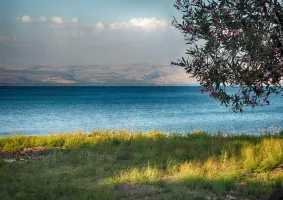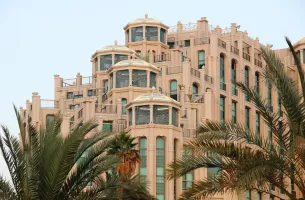Israel Museum Travel Guide
Israel, located in the Middle East, is a country with a rich historical and cultural significance. Known as the Holy Land for three major world religions - Judaism, Christianity, and Islam, Israel is famous for its ancient archaeological sites, stunning landscapes, and diverse cultural experiences. The country boasts a mix of modern cities like Tel Aviv and historic sites like Jerusalem, making it a unique destination for travelers.Top Attractions in Israel
1. The Western Wall 2. Masada 3. Dead Sea 4. Old City of Jerusalem 5. Tel Aviv BeachesIsrael is Famous for
Israel is most famous for its religious significance, archaeological treasures, and the Dead Sea, known for its high salt concentration.Top Attractions in Israel
- The Western Wall - Masada - Dead Sea - Old City of Jerusalem - Tel Aviv BeachesWhat's Great about Travelling to Israel?
- Rich historical and cultural experiences - Diverse landscapes from deserts to beaches - Culinary delights of Middle Eastern cuisine - Warm and welcoming localsWhat's Not So Great about Travelling to Israel?
- Political tensions in certain areas - High cost of living in major cities - Security concerns in some regionsTravel Tips for Israel
- Check visa requirements before traveling - Use public transportation or rental cars for getting around - Respect local customs and traditions - Stay updated on security situationsImportant Israel trip information
- Ideal Duration: 7-10 days to explore major attractions
- Best Time to Visit: Spring (March-May) and Fall (September-November) for pleasant weather
- Nearby Airports and Railway Stations: Ben Gurion Airport in Tel Aviv, HaHagana Railway Station in Tel Aviv
Per Person
87,000
*EXCLUDING APPLICABLE TAXES 5.0 Ratings
( 4 Reviews )
( 4 Reviews )
Per Person
22,540
*EXCLUDING APPLICABLE TAXES Per Person
18,500
*EXCLUDING APPLICABLE TAXES Per Person
24,560
*EXCLUDING APPLICABLE TAXES Per Person
22,340
*EXCLUDING APPLICABLE TAXES Per Person
18,500
*EXCLUDING APPLICABLE TAXES FAQ's on Israel Museum
Q1: What is the best time to visit Israel Museum?
The best time to visit the Israel Museum is during the spring (March to May) and fall (September to November) when the weather is mild, and the museum is less crowded. These seasons offer pleasant temperatures for exploring both the indoor and outdoor exhibits. Additionally, plan your visit around cultural events or exhibitions that interest you to enhance your experience at the museum.
Q2: Do I need a visa to travel to Israel Museum?
Travelers to Israel Museum typically need a visa, which can vary depending on your nationality and travel purpose. Most visitors are granted a tourist visa upon arrival, allowing stays of up to 90 days. However, it's essential to check the specific visa requirements based on your citizenship before traveling. Make sure your passport is valid for at least six months beyond your intended stay.
Q3: What are the must-visit attractions in Israel Museum?
The Israel Museum is home to some of the most significant cultural and historical artifacts in the world. Don't miss the Shrine of the Book, which houses the Dead Sea Scrolls, or the Model of Jerusalem in the Second Temple Period. Explore the extensive art collection, including works by renowned artists like Marc Chagall and Pablo Picasso. The outdoor Art Garden and the Archaeology Wing are also must-visit attractions that offer a glimpse into Israel's rich heritage.
Q4: Is Israel Museum a safe place to travel?
Israel Museum is generally safe for tourists, with tight security measures in place. However, it's essential to stay informed about any current political situations and follow local news for updates. Avoid traveling to border areas, and be mindful of your surroundings in crowded places. As in any major city, keep your belongings secure and be cautious of pickpockets in tourist areas.
Q5: What is the local currency in Israel Museum and can I use credit cards?
The local currency in Israel Museum is the Israeli Shekel (ILS). While credit cards are widely accepted in major establishments, it's advisable to carry some cash for smaller vendors or markets. ATMs are readily available throughout the city, making it convenient to withdraw cash when needed. Notify your bank of your travel plans to ensure seamless card transactions during your visit.
Q6: What is the local cuisine like in Israel Museum?
Israeli cuisine is a vibrant mix of Mediterranean, Middle Eastern, and Jewish culinary traditions. Don't miss trying popular dishes like falafel, hummus, shakshuka, and fresh pita bread. Seafood lovers can indulge in delicious fish dishes along the coastal regions. Vegetarians and vegans will find a variety of plant-based options readily available. Be sure to sample local sweets like baklava and halva for a sweet ending to your meals. Keep in mind dietary considerations and inform restaurants of any allergies or restrictions.
Q7: What transportation options are available in Israel Museum?
Getting around Israel Museum is convenient with various transportation options. Public buses and trains are efficient ways to explore different parts of the city and beyond. Taxis are also readily available, but it's advisable to use licensed cabs or ridesharing services for safety. Car rentals provide flexibility for traveling to more remote areas or for day trips. Consider using the light rail system for easy access to popular tourist sites. Plan your transportation based on your itinerary and preferred mode of travel.
Q8: Are there any cultural norms or etiquette I should be aware of when visiting Israel Museum?
When visiting Israel Museum, respect for local customs and traditions is crucial. Modesty is appreciated, especially when visiting religious sites or conservative areas. It is customary to greet locals with a friendly "Shalom" and show respect for the diverse cultural heritage of the country. When dining, remember that many restaurants observe kosher dietary laws, so be mindful of food choices and dining etiquette. Understanding the significance of certain symbols or practices, such as the Sabbath, can enhance your cultural experience. Embrace the warmth and hospitality of the locals, and be open to learning about the rich tapestry of Israeli culture.
Q9: I am a travel agent. How can I buy travel leads of Israel Museum?
Register yourself as a travel agent at agents.tripclap.com and then you can buy travel leads to Israel Museum once your account is approved. For more details contact our support team at +91-8069186564 or support@tripclap.com






